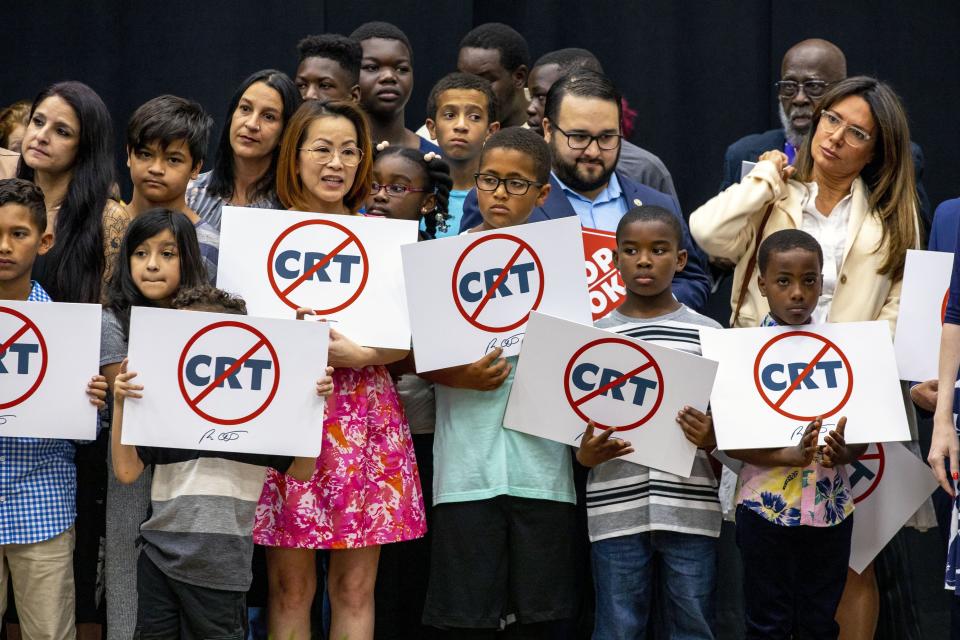Under the appearance of fairness, HB 7 pushes a clear agenda denying racial injustice
- Oops!Something went wrong.Please try again later.
House Bill 7 is forcing K-12 schools and universities to teach the far right’s made-up reality or simply relinquish the teaching of race — which has been, and continues to be, a fundamental part of our nation’s history.
Gov. Ron DeSantis signed HB 7 into law in a naked attempt to rally his base of conservative white (and some non-white) voters appalled by the racial reckoning of Black Lives Matter. Under the guise of objectivity, neutrality and equality, the law makes it illegal to teach about U.S. structural racism.
For instance, the law makes it discriminatory to teach that a person’s status as either privileged or oppressed is necessarily racially determined. On the surface this law might seem fair — after all, there are poor whites and rich Blacks and people of color. But oppression is often racially determined, affecting the daily lives of Blacks and people of color alone.
Possible penalties for UF: Change teachings on racism or risk $100M in funding
What the law says: State law in Florida still requires schools to teach about racism
Another opinion: Under DeSantis, national culture wars have reached the classroom

Examples include the red lining that continues to date, “loitering” policed by suburban vigilantes everywhere and Black people arrested or killed while running (Ahmaud Arbery), coming home at night in affluent neighborhoods (Henry Louis Gates) and being in police custody (George Floyd).
Some years ago, while working with editor Sam Hampton on my documentary, “In His Own Home” (about racist police brutality at the University of Florida), we discussed including a segment from Police Beat, a show of the Gainesville Police Department.
The clip shows police stopping a young Black male for a license plate violation. While the bewildered man looks on, police search the glove compartment, floor, seats and trunk. As the police handcuff the man, an officer explains his proactivity: apprehending a person with a bad license could turn into a drug arrest — and while these people are not necessarily “bad,” they might interact with criminals, which could solve many problems.
Sam, who is Black, didn’t think the clip worth including because he was routinely stopped and this kind of racial profiling was common knowledge. I disagreed. While whites might read about “driving while Black,” its materiality is far removed from their lives and most think it an aberration. Black people know better. Law enforcement and laws are frequently not universal or neutral.
From literacy requirements and poll taxes designed to keep Blacks from voting, to Richard Nixon’s initiation of drug laws to the infamous “stand your ground” laws of today, the objectivity and neutrality of laws can be assessed by a simple litmus test: How do they affect different races? Ask, for example, what if Kyle Rittenhouse was Black?
Since the 1970s, legal scholars have questioned the neutrality of laws through a call to context; their analyses have invigorated subjects such as history, sociology and literature. For teachers of ethnic studies, the roots of which lie in the antiracist and anticolonial social movements — Civil Rights and antiwar — racial oppression is a basic part of literature they teach, though obviously not the only aspect of it.
It is fundamental to my teaching. How else would one teach the literature of slavery (Frederick Douglass, Sojourner Truth, Harriet Jacobs) or the contemporary work of the Nobel laureate Toni Morrison, or science fiction writer Octavia Butler, or of Asian-American writers such as Carlos Bulosan or David Henry Hwang?
Clearly, the answer is not to teach them. The penalties for teaching about race under HB 7 are severe: Teachers potentially face losing their jobs and universities where such violations occur can lose performance funding of more $100,000 for a year. (Currently, the law has been partially blocked due to a court challenge.)
UF has made the task of enforcing HB 7 easier by proudly featuring a snitch button at the top of the home page of UF’s website, www.ufl.edu. Through this button a user can accuse an instructor of violating HB 7.
The instructor never gets a chance to face the accuser. Needless to say, many instructors will be looking for jobs elsewhere.
Under the appearance of fairness, HB 7 pushes a clear agenda denying racial injustice. “Racial colorblindness,” a seemingly benign ideology that took hold in the 1980s, is declared a virtue that cannot be deemed in any way racist. But it has been found by historians, sociologists, legal scholars and political scientists to be politically used as a means to repeal affirmative action policies and push back civil rights gains.
Legal scholar David B. Wilkins writes that “the harm of perpetuating race consciousness ... must be balanced against the harm of ignoring reality.” But the far right would rather make reality rather than interpret it.
Malini Johar Schueller is a professor of English at UF.
Join the conversation
Letters to the editor present the opinions of readers on news stories and other pieces published by The Sun. Share your opinion by sending a letter to the editor (up to 200 words) to letters@gainesville.com. Letters must include the writer's full name and city of residence. Additional guidelines for submitting letters and longer guest columns can be found at bit.ly/sunopinionguidelines.
Journalism matters. Your support matters.
Get a digital subscription to the Gainesville Sun. Includes must-see content on Gainesville.com and Gatorsports.com, breaking news and updates on all your devices, and access to the eEdition. Visit www.gainesville.com/subscribenow to sign up.
This article originally appeared on The Gainesville Sun: Malini Johar Schueller: Florida's House Bill 7 hides racial injustice

